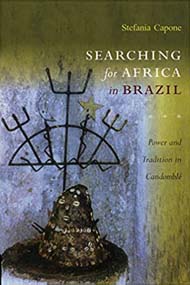Searching for Afrika in Brazil
Power and Tradition in Candomblé
Stefania Capone
Published by Duke University Press, 2010
Searching for Africa in Brazil is a learned exploration of tradition and change in Afro-Brazilian
religions. Focusing on the convergence of anthropologists' and religious leaders' exegeses,
Stefania Capone argues that twentieth-century anthropological research contributed to the
construction of an ideal Afro-Brazilian religious orthodoxy identified with the Nagô (Yoruba)
cult in the northeastern state of Bahia. In contrast to other researchers, Capone foregrounds
the agency of Candomblé leaders. She demonstrates that they successfully imposed their
vision of Candomblé on anthropologists, reshaping in their own interest narratives of
Afro-Brazilian religious practice. The anthropological narratives were then taken as official
accounts of religious orthodoxy by many practitioners of Afro-Brazilian religions in Brazil.
Capone draws on ten years of ethnographic fieldwork in Salvador de Bahia and Rio de
Janeiro as she demonstrates that there is no pure or orthodox Afro-Brazilian religion.
To illuminate the continuum of Afro-Brazilian religious practice and the tensions between
exegetic discourses and ritual practices, Capone focuses on the figure of Exu, the sacred African
trickster who allows communication between gods and men. Following Exu and his avatars,
she discloses the centrality of notions of prestige and power - mystical and religious - in
Afro-Brazilian religions. To explain how religious identity is constantly negotiated among
social actors, Capone emphasizes the agency of practitioners and their political agendas in
the ""return to roots," or re-Africanization, movement, an attempt to recover the original
purity of a mythical and legitimizing Africa.
"The translation of this outstanding work into English is a real service to scholars.
Searching for Afrika in Brazil is a well researched and carefully argued examination of
the ongoing disputations about the origins and transformations in Candomblé.
Stefania Capone is particulary insightful regarding the role that outsiders have played in
shaping disputes about authenticity, sources, and their relation to African origins."
- Anani Dzidzienyo, co-editor of Neither enemies nor friends: Latinos, Blacks, Afro-Latinos
"Searching for Africa in Brazil is a major piece of scholarship. Through careful historical research
and vivid ethnographic detail, Stefania Capone demonstrates that conceptual pairs such as
pure/impure, religious/magical, traditional/modernized, and communal/individualistic have
long played a major role in highly self-conscious and overtly politicized representations
of Afro-Brazilian religion. This is so both in regard to practitioners' discourses aimed at
legitimizing their forms of practice at the expense of their rivals' and in regard to the
changing views of anthropologists who sought a definitional monopoly over what could
count as 'African,' 'traditional,' and so forth."
- Stephan Palmié, author of Wizards and Scientists: Explorations in Afro-Cuban modernity and tradition
Stefania Capone is a professor at the French National Center for Scientific Research and the
Center for International Research in the Humanities and Social Sciences at New York University.
(The text above comes from the back of the book)



